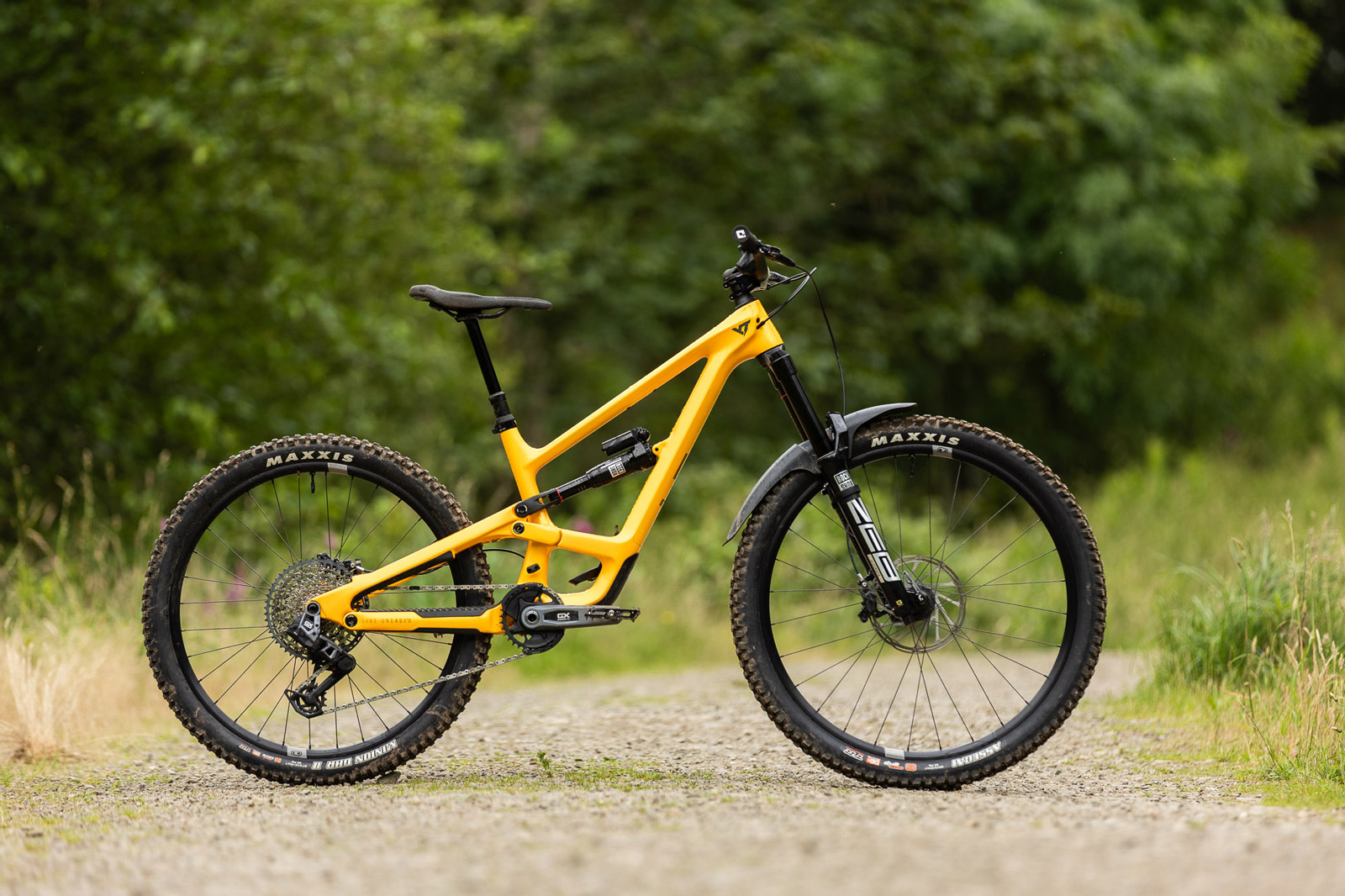YT is a German direct-to-consumer mountain bike brand known for its offering of very reasonably-priced bikes with quality components. Reviewed here is one such example; the YT Capra MX Core 3. Priced at $4,599 USD (£4,599), this 170mm travel enduro bike fetches you a lot of bang for your buck.
A full carbon frame is fronted by a RockShox Zeb Ultimate fork paired with a Super Deluxe Ultimate shock. It rolls on a Crankbrothers Synthesis Enduro Wheelset, and is driven by a SRAM GX Eagle AXS drivetrain. These are just some of the highlight components on this build. In the context of a sale price of $3,499 USD, one might even call the YT Capra MX Core 3 an affordable MTB. Sure, it’s not CostCo affordable, or Decathlon affordable, but sat beside a similarly-priced Trek Slash, the value-for-money is undeniable.
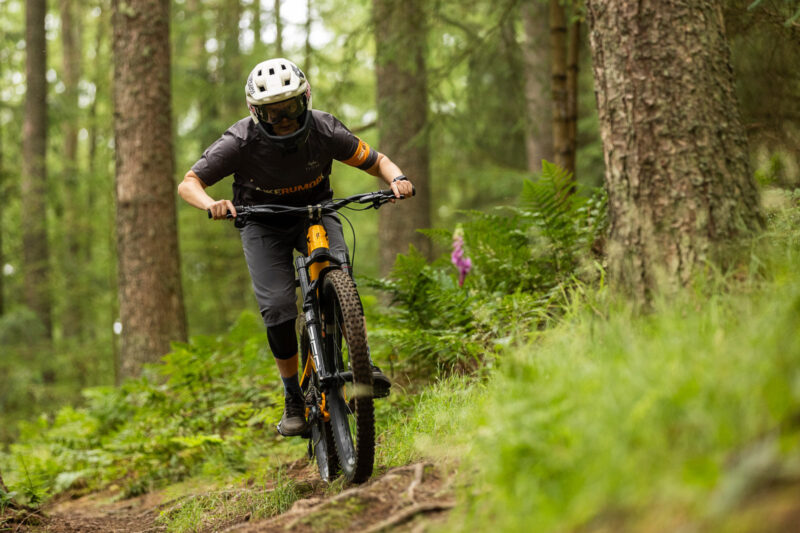
But, value-for-money is in the context of overall performance, right? It may look good on paper, but if it leaves you wanting on the trail…
To better-equip prospective customers with an idea of that overall performance, we tested the Capra MX Core 3 over a two month period. Terrain varied from Bike Park laps in Leogang, Lenzerheide and Wales, to more pedal-focused loops of some EDR Tweed Valley tracks. Detailed insight below.
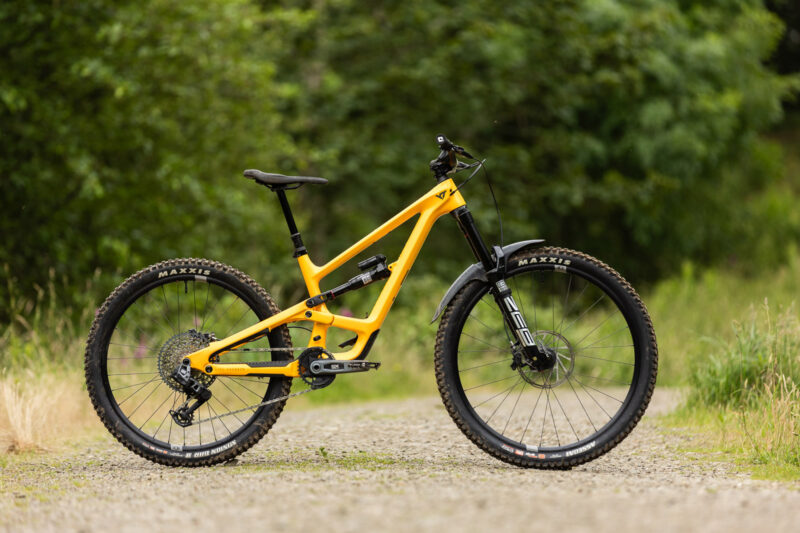
YT Capra MX Core 3 | An Overview
At risk of stating the obvious, the YT Capra MX has a 29″ front wheel and a 27.5″ rear wheel. This frameset is dedicated to that configuration. There is a full 29″ Capra. YT say that one is aimed at out-and-trail riding speed. Meanwhile, the MX tested here is the better option for Bike Park laps, or shorter riders like myself.
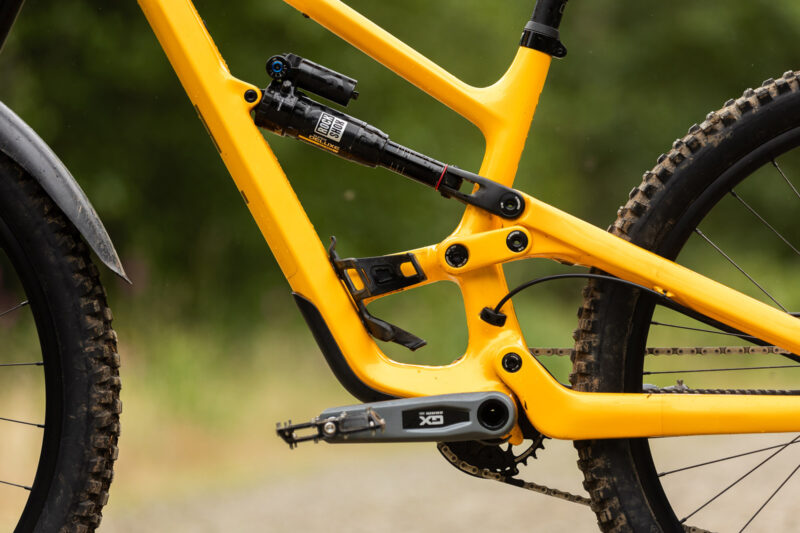
Kinematic
The Capra Core 3 runs a full carbon frame, with a four-bar linkage that positions the rear shock horizontally within the front triangle; YT call the platform the V4L, or the Virtual Four Link. The brand doesn’t don’t publish leverage curve information, but a trip to their website does yield anti-squat and anti-rise graphs. While we recognise these numbers are highly contextual, and don’t really paint a complete picture of how the suspension performs, we understand some readers will appreciate seeing them.

As for the leverage ratio, we do know the Capra MX is amenable to the progressivity of an air shock, as well as the linearity of a coil shock. While most models come with an air shock, the Uncaged 11 model released recently comes with an Ohlins TTX22 M coil shock.
Geometry
The Capra MX is available in Sizes S-XXL. The S-L frames all run a 433mm chainstay length, while the XL and XXL frames get a longer rear end of 438mm. Reach spans a 424mm to 504mm range, with the large coming in at 464mm. Seat tubes aren’t the shortest we’ve seen (445mm on the large), but should nevertheless be very workable for the vast majority of riders. The small gets a 125mm dropper, the medium a 150mm dropper, while the L-XXL run 200mm.
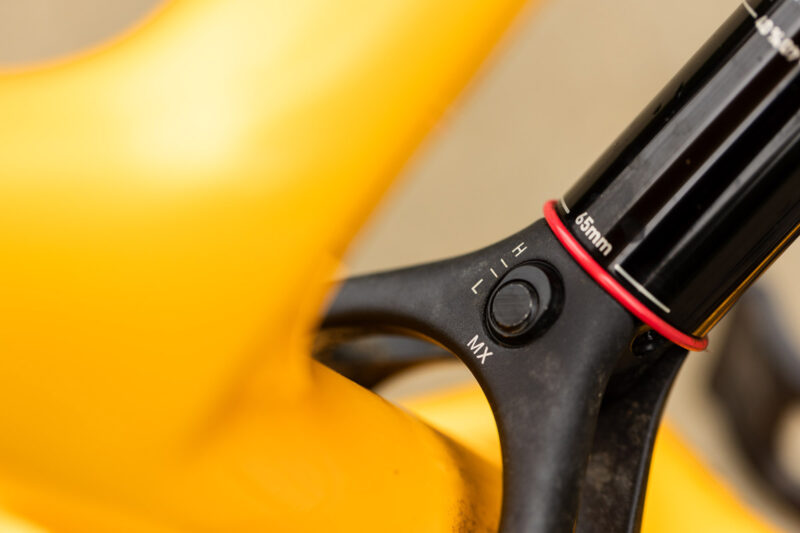
Geometry is adjustable by virtue of a flip-chip at the lower shock mount, though we rode the Capra MX only in the low position. That gives it a 64° head angle, 77.5° effective seat tube angle (71° actual) with the BB at 346mm. The high geo position doesn’t alter things too dramatically; the BB is raised by 5mm, the head angle steepened to 64.3°, and the effective seat tube angle moves to 77.8°. Click to enlarge the geometry chart below for more details.
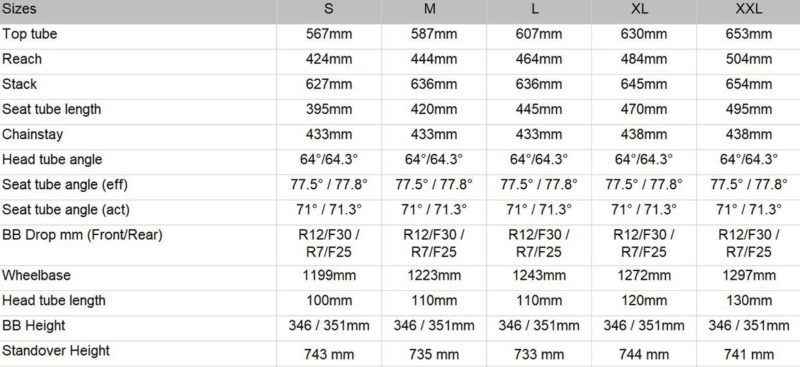
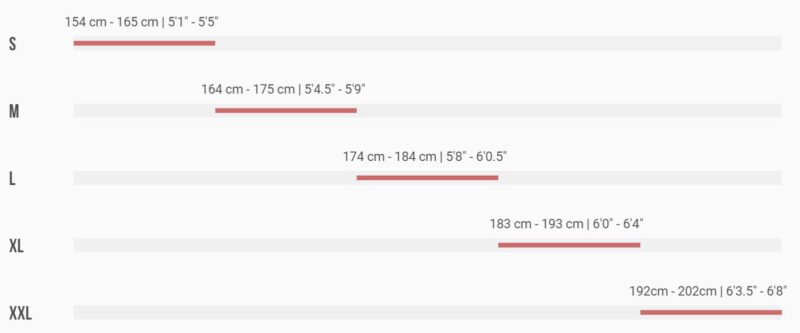
Key Frame Details
- Press-fit Bottom Bracket
- ISCG 05 Tabs for Bash Guard and Chain Guide
- SRAM UDH (Transmission-compatible)
- Boost 148mm Spacing
- 31.6mm diameter seat tube
- Fully guided internal cable routing
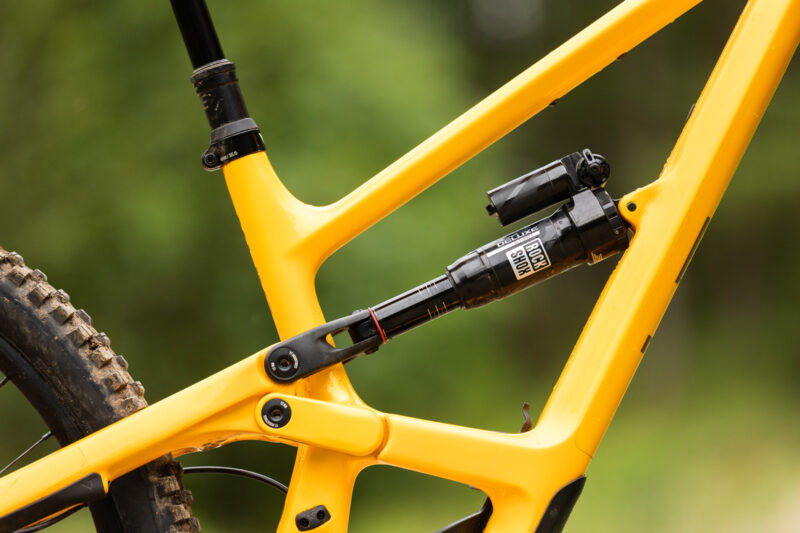
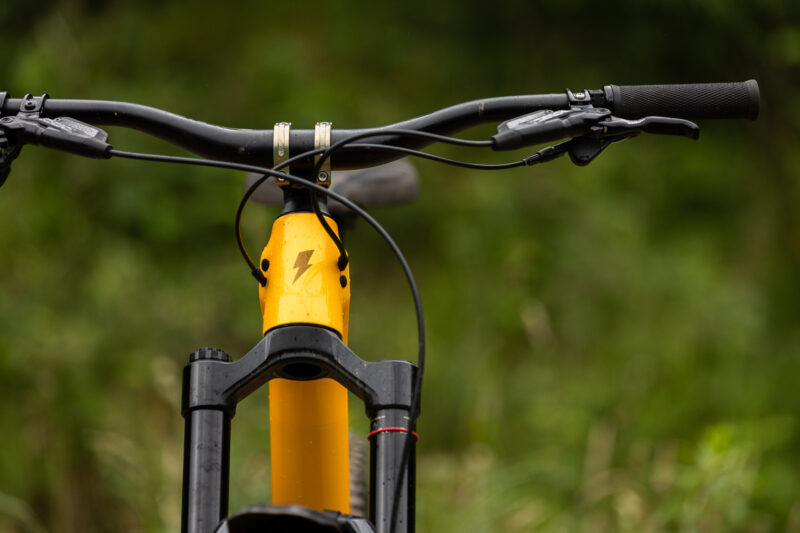
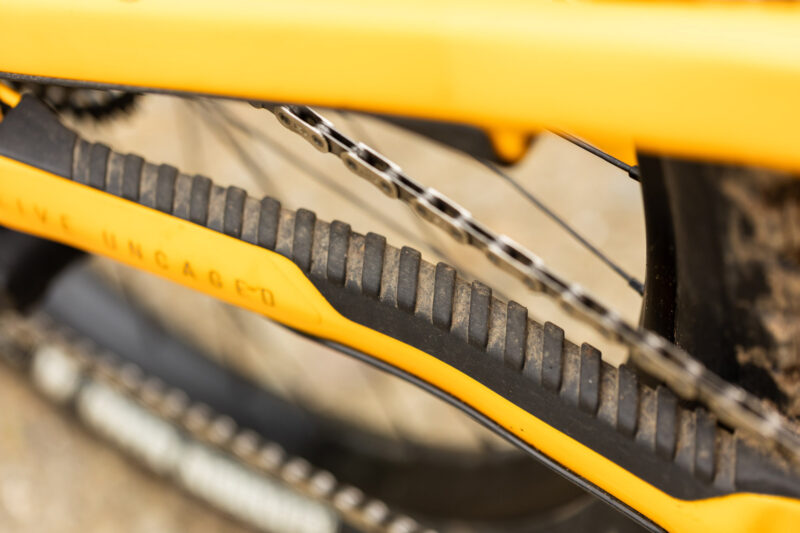
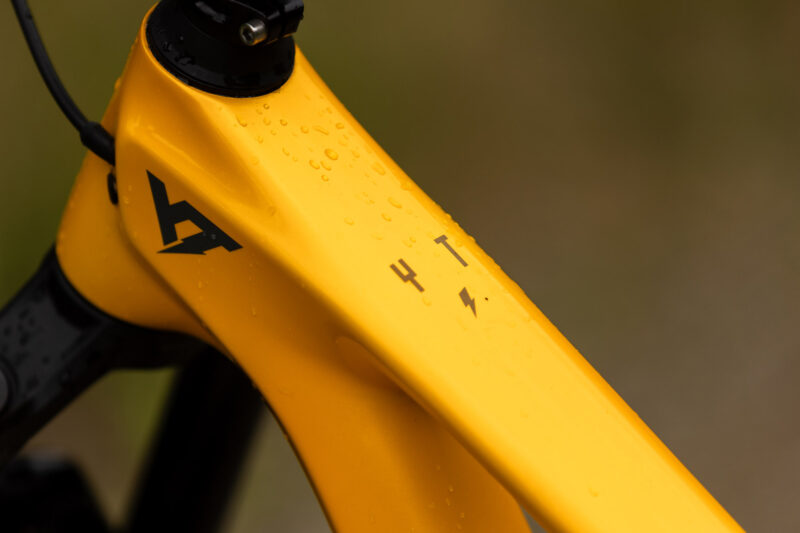
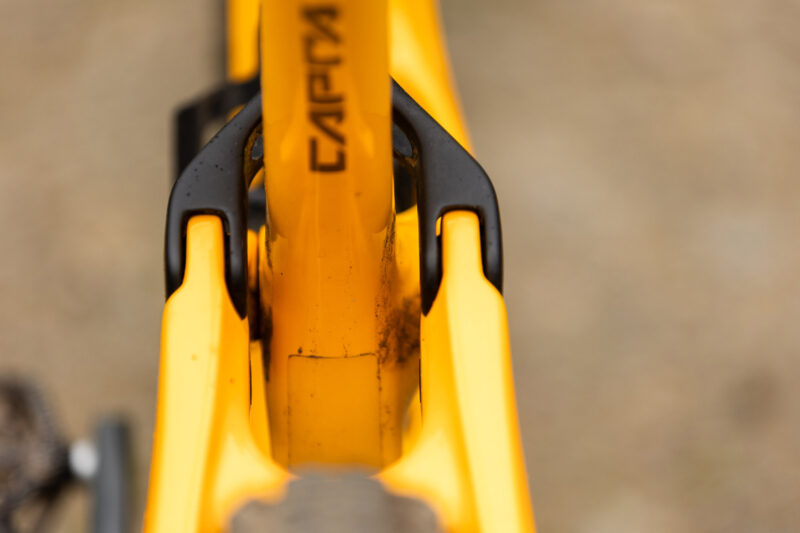
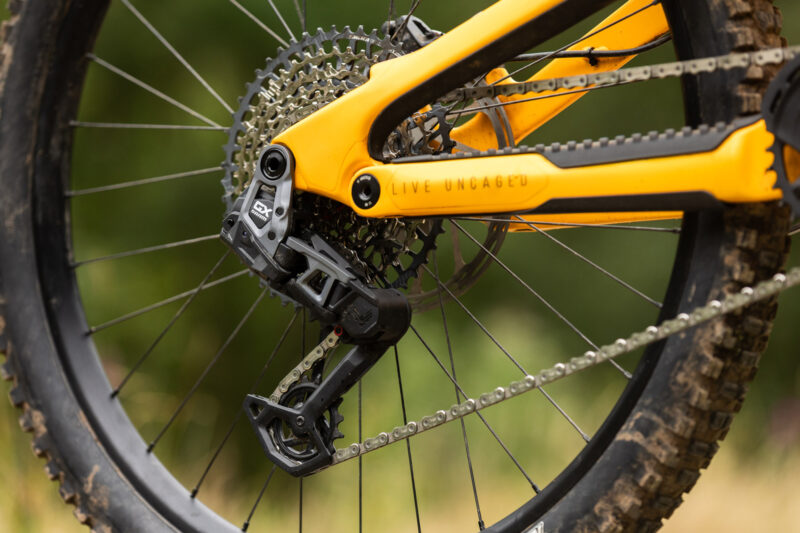
Ride Impressions | YT Capra MX
At 163cm tall (5ft 4″), I tested the Capra MX in size small with a reach of 424mm and a seat tube length of 395mm. In the context of other bikes I have tested recently, that’s quite short. Honestly, the bike’s ease of handling has made me question my recent purchase of a frame with a 447mm reach, but that’s a story for another time.
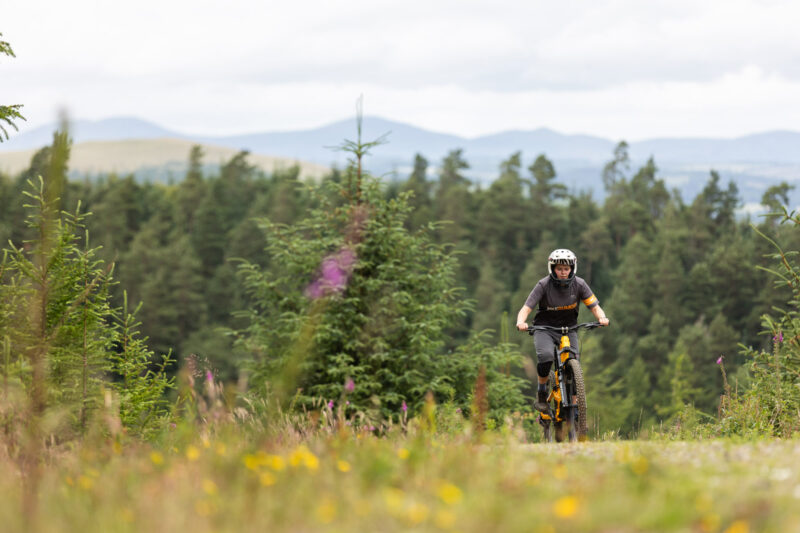
I switched out a few fit-related parts. The 125mm YT Postman dropper was replaced by a 150mm OneUp V2, delivering 25mm more clearance in the context of my 621mm saddle height. I also cut the 800mm Renthal bar down to 740mm, and swapped the SDG Bel-Air saddle for an SQlab 60X Infinergy Ergowave Active 2.1 saddle.
While I ran the stock SRAM GX Eagle AXS drivetrain for the first few rides, I spent the majority of my time running the latest Transmission version thereof.
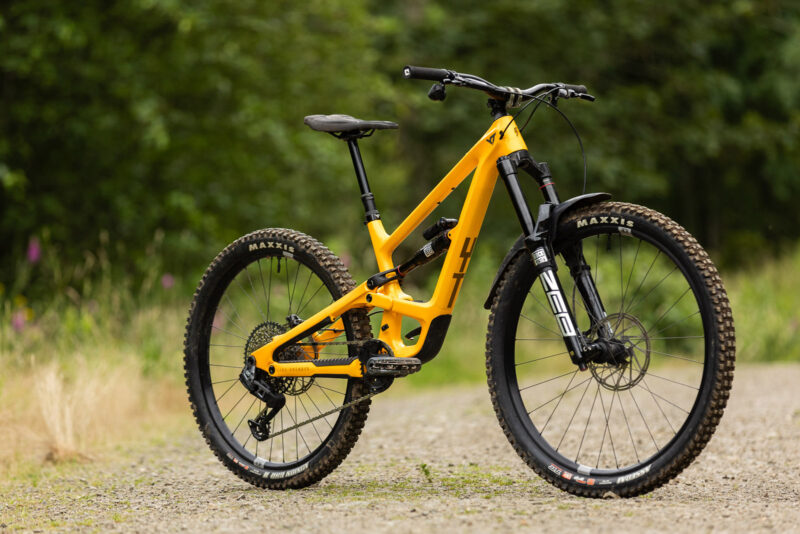
I opted to position the saddle forward on its rails. That’s not because I deem the effective seat tube angle of 77.5° terribly slack, but because I have sit bone discomfort associated with an old injury, and this position alleviates it somewhat. It does force more weight onto my hands, though. On flat fire roads, that can be a little annoying, but I spend most of the time winching up inclines, so it’s a bit of a non-issue.
Climbing
While this set up may be considered extreme by some, it comes in very handy on steeper climbs, helping to keep weight centered. It certainly goes some way to offsetting the wandering tendencies of a slack 64° head angle. I’ve had no trouble cleaning some steep, tight and technical singletrack climbs on the Capra MX. It is a good climber, but the Merida ONE-SIXTY pips it in this department, likely thanks to the reduced rearward bias afforded by a steeper seat tube angle.
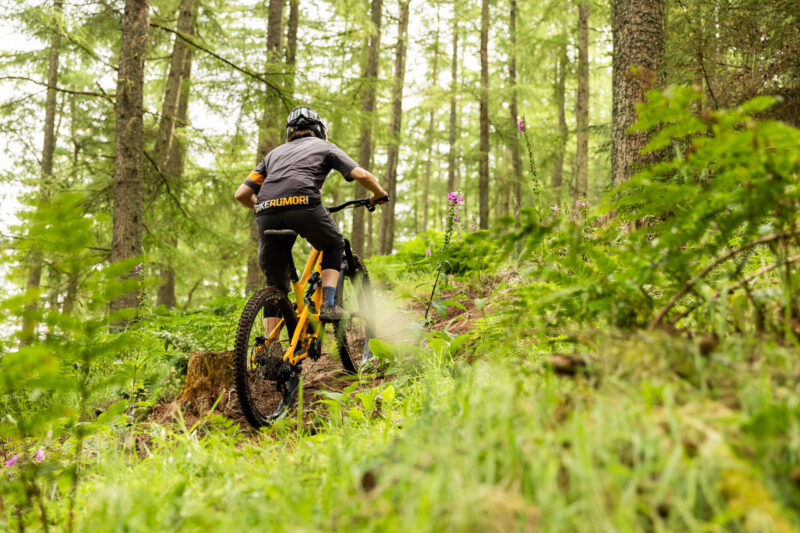
The bike has a very neutral pedalling character. In the climbing gears, there’s no noticeable sucking down or extension of the shock away from sag. Indeed, my experience of the Capra’s climbing efficiency is consistent with the anti-squat values published on the YT website. On the flip side, laying down the power in the smaller sprockets of the cassette comes with pronounced pedal bob which can make it feel a bit sluggish in a sprint.
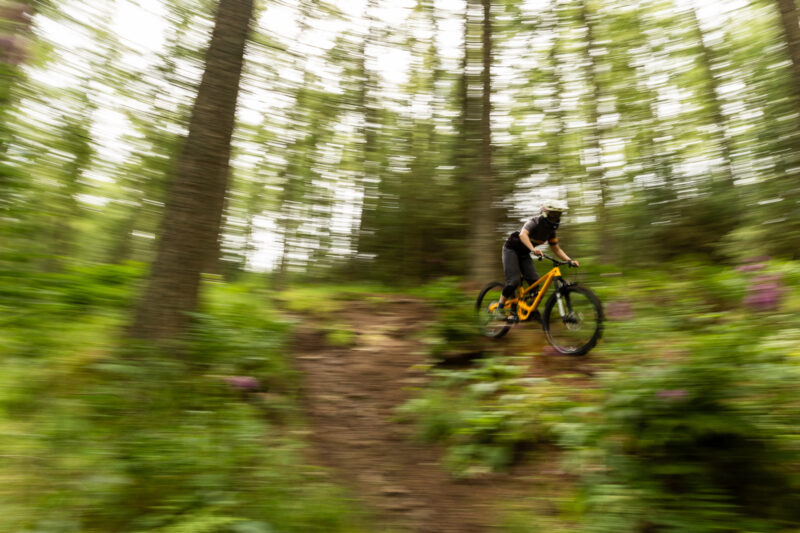
Descending
I ran the YT Capra MX in the low geometry position throughout the test period. The RockShox Super Deluxe Ultimate shock comes with 2 volume spacers as stock, which I found to be appropriate. A pressure of 106 PSI put sag just shy of 30% for my 60 kg. I left the rebound and low speed compression damping fully open, with high speed compression at either one or two clicks from fully open, depending on the nature of the tracks.
Finding a sweet spot with the RockShox Zeb Ultimate fork proved troublesome. I removed the single token that is stock on this build, and went with 38.5 PSI for the vast majority of the test period. That is a little under the minimum recommended pressure from RockShox but I found it helped me use more of the fork’s 170mm travel. I ran rebound and HSC damping fully open, with LSC at 4 clicks from fully open.
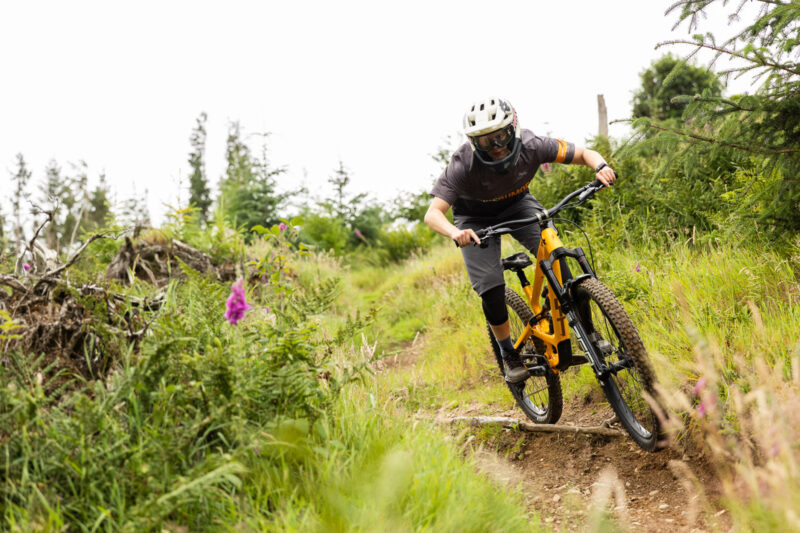
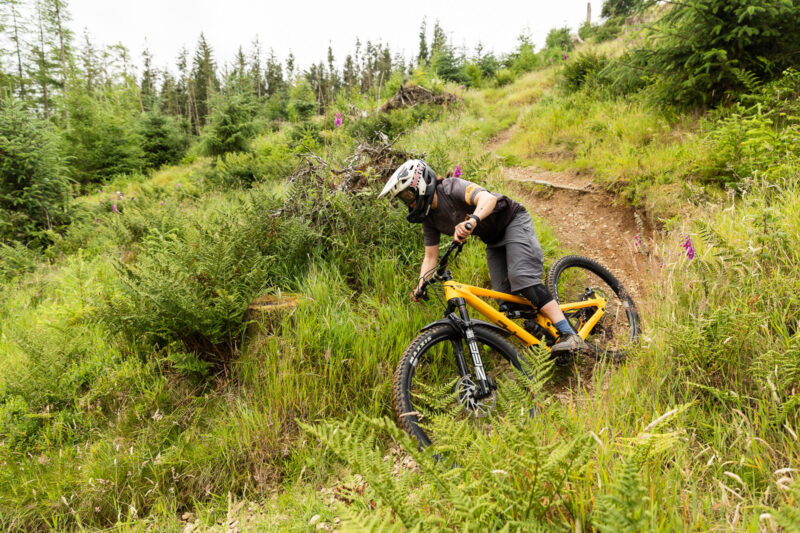
For bike park laps, I bumped the pressure up to 42 PSI. On these faster tracks, I was happy to trade out travel usage for faster rebound speed over braking bumps. While this delivered a marked improvement in traction on rougher off-camber sections, it remained insufficient to deliver safe, consistent traction on the fastest sections.
The Capra MX is very intuitive to handle. The bike’s steering geometry rewards an aggressive stance, delivering a very natural feel that gives me a high level of control. In comparison to the slightly longer Merida ONE-SIXTY, another MX enduro bike of similar travel numbers, handling of the YT comes more naturally to me.
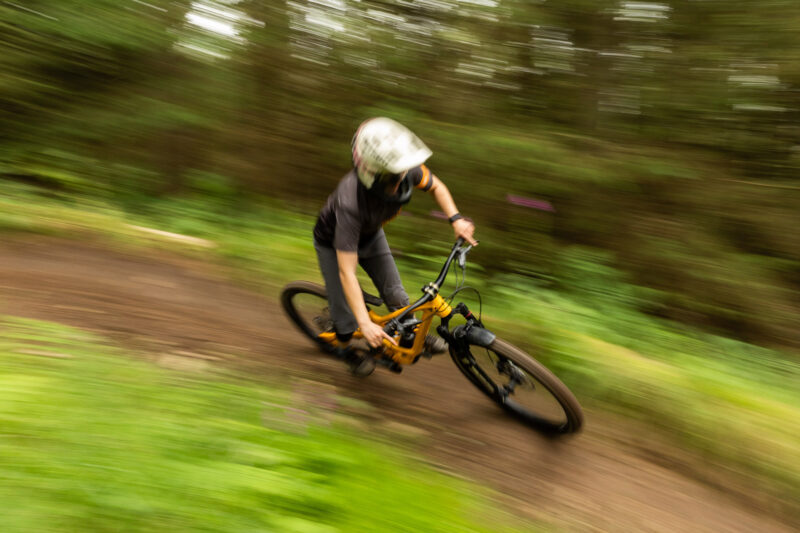
I felt no real need to deviate from the 50mm stem and 20mm rise Renthal bar. However, I did find myself benefiting from a more comfortable descending position that came with the 35mm rise bar from OneUp; it certainly enhanced my confidence in steeper terrain. It could be a good idea for YT and other manufacturers to leave the fork’s steerer tube a little longer; that will allow riders to experiment with ride height without having to shell out for a new bar.
Nevertheless, I got pretty comfortable on this bike early on in the review period, especially thanks to the ease of handling that comes with what feels to be a very good fit. I can really jam myself in between the pedals and the bar to make the bike respond to everything I give it.
While it’s not the most sensitive suspension platform, the rear wheel does track the ground pretty well over rough terrain, at least when I’m not braking. But, it does seem to get hung up on square-edged hits, stealing momentum. Indeed, the Capra is always going to struggle to compete with enduro bikes that have a higher main pivot – bikes like the Hope HB 916 or the GT Force that have a more rearward axle path, the former delivering something of a magic carpet feel.
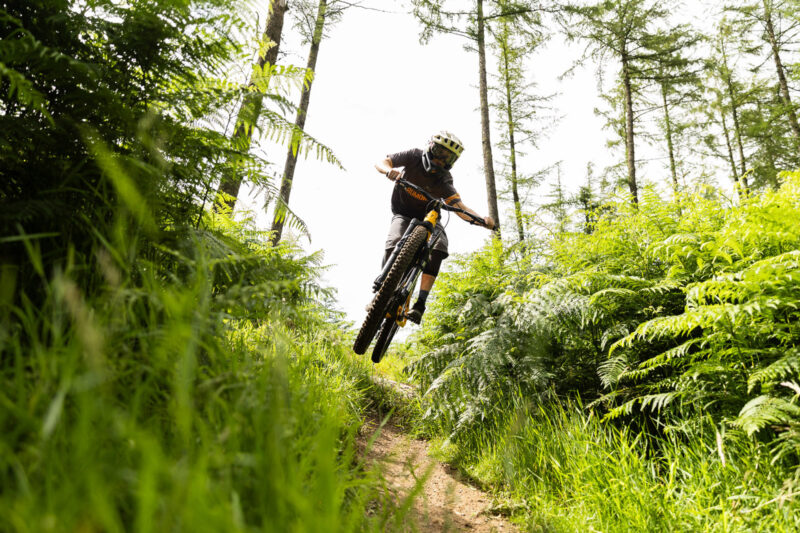
The Capra makes up for that with its nimbleness, though. It’s more poppy and playful than either of the abovementioned. And the more comparable Merida ONE-SIXTY and Vitus Sommet 297, actually. For context, those two are MX enduro bikes of a similar geometry and price point.
A Downfall
The Capra’s anti-rise value of around 70% at sag suggests the suspension will have a tendency to extend under braking. I can’t say I felt the bike to be particularly tall under heavy braking. But, traction was certainly diminished while on the brakes, especially over braking bumps in the bike park. And, latterly, the rougher trails of the Tweed Valley, especially now that things have begun to dry out and speeds are increasing as a result.
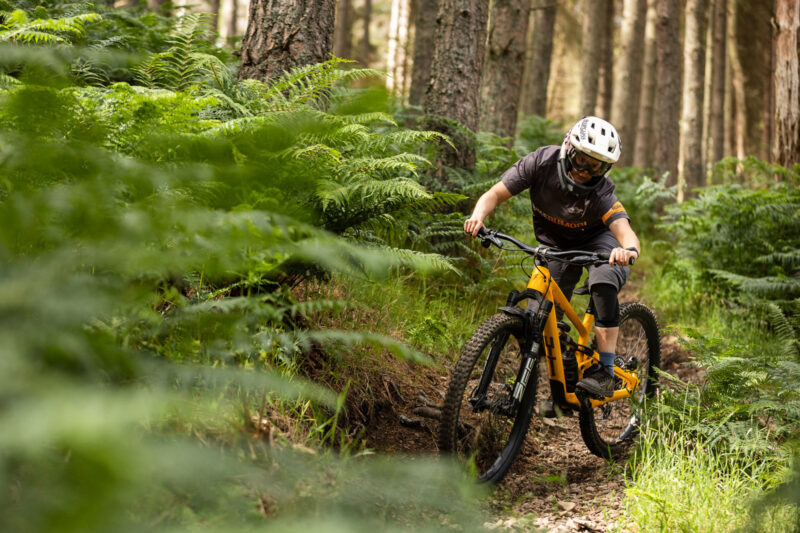
The shock could be packing down due to insufficient rebound speed. However, I think it more likely that braking is reducing the suspension’s sensitivity. Of course, it could be a mix of the two, but i’m inclined to apportion blame to the braking, given that rear wheel tracking seems to be much better when i’m not pulling on the brakes. Either way, Bike Park Leogang saw my feet bouncing off my flat pedals a little too often for my liking. This issue was much less prevalent when riding the relatively slower enduro tracks of the Tweed Valley, but still an occasional feature.
Back to the Good Bits
In regard to travel usage, I felt the use of two tokens in the rear shock was spot on. On some of the faster trails of the Tweed Valley, those with big compressions, I was able to use all of the travel. The o-ring made it to the end of the shock’s 65mm stroke on almost every ride. There were only two occasions that I actually felt the bottom-out. On neither of those occasions was it particularly jarring, credit to the Super Deluxe Ultimate’s hydraulic bottom-out.
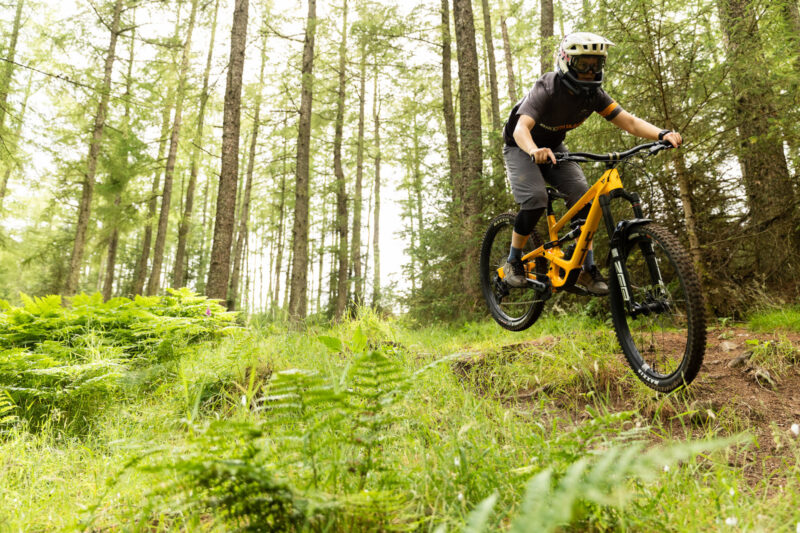
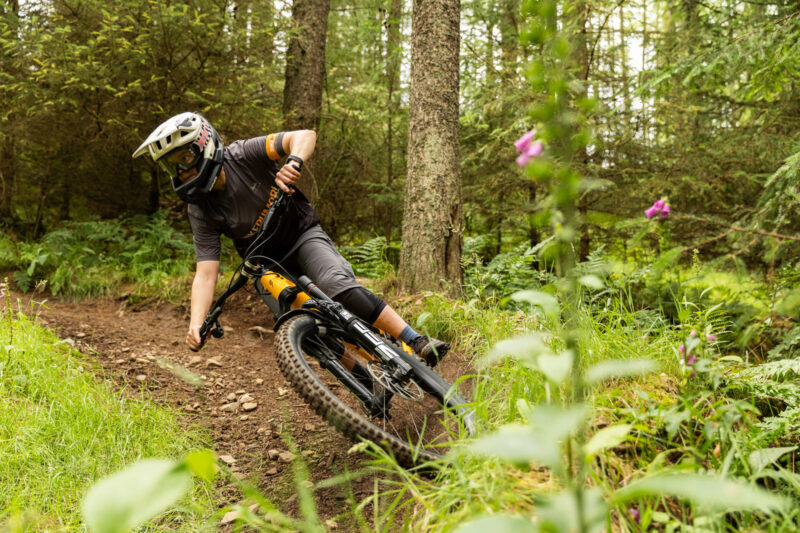
On smooth, carved out berms of the bike park, the YT Capra MX was truly excellent. It effortlessly held a line through berms at speed, with the shock offering heaps of mid-stroke support. The bike’s geometry remains consistent throughout the compression, making it feel very safe and predictable. As a result, there is little risk of under-steer or over-steer on the exit. In these scenarios, the bike excels.
Summary | YT Capra MX Core 3
Overall, I feel the YT Capra MX Core 3 is a good enduro bike at a very reasonable price point, particularly with its sale price of $3,499 USD (at the time of writing) – RRP is $4,599. And, I had a lot of fun riding it. This bike is most at home on slower, steep, technical singletrack, and smooth flow trails of the bike park, making it pretty versatile.
Sure, I believe there is room for improvement. For me, there’s some performance benefit to be had in a lighter rebound tune on the fork and shock. But, you’ll find that is a common complaint of mine, not really specific to this bike. Of course, the big brands aren’t optimizing performance for 60 kg riders as we are a small portion of the intended market. Sadly, the external adjustment dials only get you so far. Brands like Rocky Mountain are to be applauded for going the extra mile with a frame size-specific shock tune.
A couple hundred pounds spent on aftermarket tuning could turn this good enduro bike into a great enduro bike. Even then, you would still not have spent as much as if you’d bought a Rocky Mountain at an equivalent spec level.
Pros
- Great aggressive geometry
- Highly maneuverable and playful
- Very reasonably priced
- Cables not routed through headset
- Reasonable weight
Cons
- Suspension (especially the fork) feels over-damped for lighter riders
- Can feel unsettled under braking on rougher terrain







Component Performance
- Frame: No issues to report here.
- RockShox Zeb Ultimate Fork: The fork performance left me wanting. At the minimum recommended pressure of 42 PSI, rebound speed is insufficient to maintain consistent traction in rough terrain at speed. The fork’s CSU developed an appalling creak early on in the test period. We would have preferred the steerer tube to be left longer to allow for ride height adjustment.
- RockShox Super Deluxe Ultimate Shock: At 60 kg, it’s possible I’d benefit from a lighter rebound tune on this shock.
- SRAM Code R Brakes: One bleed required over the 2 month test period. These offer sufficient power for their intended purpose, but they are certainly not as powerful as some other brakes like the Hope Tech 4 E4s.
- SRAM GX Eagle AXS Drivetrain: Derailleur performs well enough in terms of its shifting, but the SRAM GX Eagle AXS Transmission I replaced it with has the more effective clutch. As a result, it is much quieter on the trail.
- Crankbrothers Synthesis Enduro Alloy Wheelset: Rear rim sustained a considerable dent, but still maintained a good seal with the tire. Great otherwise.
- Maxxis Assegai, MaxxGrip, EXO+: Excellent.
- Maxxis Minion DHRII, MaxxTerra, EXO+: A DoubleDown casing tire would’ve been the more appropriate choice, given the bike’s intentions. One pinch flat to report, sustained at a pressure of 24 PSI while riding the bike park.
- Renthal Apex 35 Stem: No qualms.
- Renthal Alloy Bar, 20mm rise: The bar felt to be very stiff and unforgiving, but it’s entirely possible the underwhelming performance of the fork was partly responsible for the harshness transferred to my hands.
- YT Postman Dropper: Not tested.
- ODI Elite Motion V2.1: Excellent, with super tacky rubber.
- SDG Bel-Air 3.0 Saddle: Not tested.
- E13 TRS PLUS Chain Guide: No qualms.
Warranty
The YT Capra MX Core 3 is sold with a two year warranty which is transferable to a second owner. The original owner also benefits from an additional three-year guarantee.
